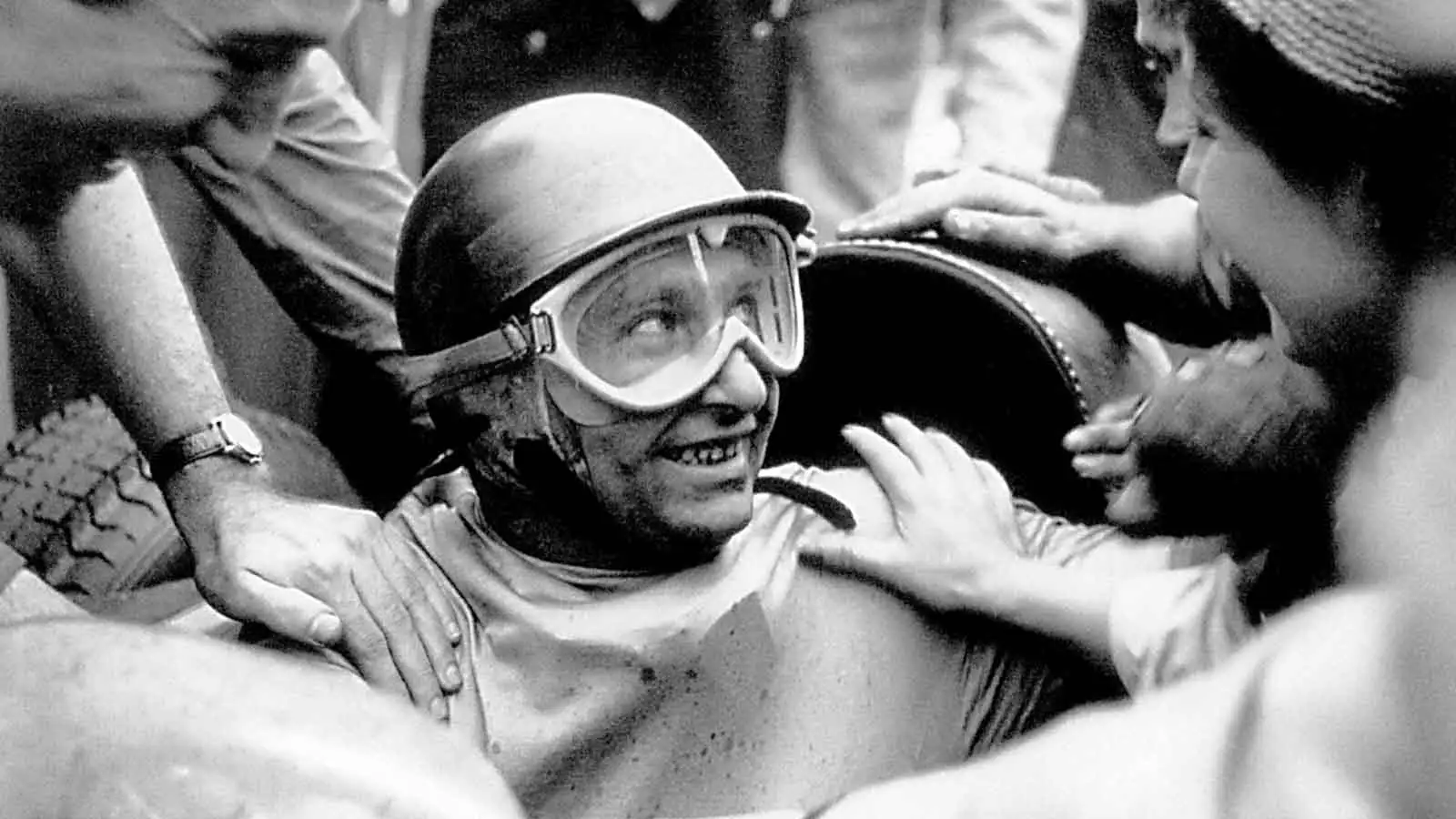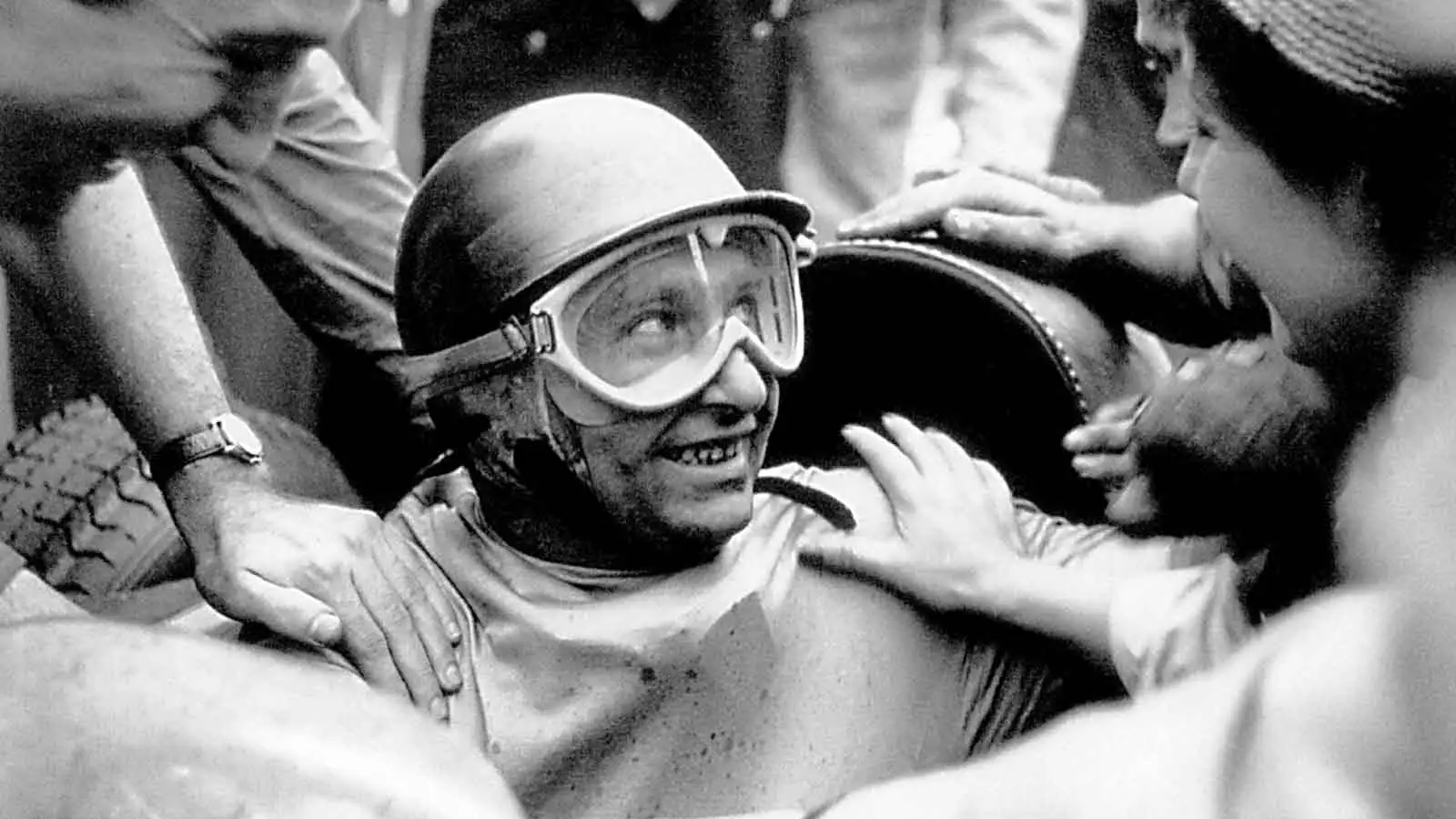
Measuring the greatness of F1 drivers down the generations is a minefield of caveats, asterisks and exceptions. Win percentages can serve to level the playing field somewhat, though.
The challenges Max Verstappen faced during last season’s 22-race campaign are worlds apart from those Juan Manuel Fangio faced at the World Championship’s inception, yet it’s impossible not to wonder who would win a one-on-one duel.
Lewis Hamilton might have won the most Formula 1 races but as the sport continues to grow away from its humble roots, the talent of past champions can never be discounted.
However, we have omitted two names for this list. American drivers Lee Wallard (50 per cent) and Bill Vukovich (40 per cent) never competed in a Grand Prix in Europe, but triumphed at the Indy 500 when it was on the Formula 1 calendar between 1950 and 1960.
So, here are the top 10 Formula 1 drivers based on their Grand Prix win rate…
[Figures correct as of June 2024]
10: Stirling Moss – 24.24%
The fact Stirling Moss, one of motorsport’s greatest figures, never celebrated World Championship glory becomes ever more mind-blowing when you consider he won a quarter of the 66 Grands Prix he entered.
In a 10-year Formula 1 career driving for the likes of Mercedes, Maserati and Lotus, Moss finished the season in second place four times, with a further four bronze medals.
The British icon, who passed away aged 90 in 2020, did battle with legends like Juan Manuel Fangio and Jack Brabham. He is often considered the greatest driver to never win the title, and rightly so.
8: Ayrton Senna – 25.47%
The darling of Brazil and an inspiration to countless Formula 1 stars of the past, present and future, Ayrton Senna’s greatness and tragedy can’t be summed-up in statistics.
The three-time World Champion earned 41 victories in a wonderful 10-year career and no doubt would have added many more but for his tragic and fatal crash at the 1994 San Marino Grand Prix.
At a rate of more than a victory every four races, Senna surely would have ended his career alongside Lewis Hamilton and Michael Schumacher in the top-three winningest drivers. The Brazilian sits fifth despite the championship calendar featuring fewer races in his era.
8: Alain Prost – 25.63%
Senna’s bitter rival barely edges him on win percentage. The Formula 1 icons were often too close for comfort on-track, and wound up just the same in the history books.
The 51 victories from 199 starts Prost amassed brought four World Championships, after a career associated with F1’s defining teams Ferrari, McLaren, Williams and Renault.
Prost’s battles with Senna were unforgettable, with two final round crashes between the two uncompromising legends deciding two World Championships.
7: Jackie Stewart – 27.27%
Like Prost, Jackie Stewart walked away from F1 with the World Championship under his arm – choosing to end his career at the very top, aged 34.
Stewart cited the extreme risks that came with an F1 career in the 1960s and 70s as his reason for retiring, and lobbied successfully for important safety upgrades in retirement.
Despite being aware of the risks, the ‘Flying Scot’ piloted those would-be death machines of his era to three Championships inside five years, ending his career with 27 victories from 99 races as the standout talent of his generation.
6: Michael Schumacher – 29.64%
Michael Schumacher was not focused on statistics when he returned to Formula 1 following a three-year hiatus in 2010. He’d already dealt with those.
But without the 58 winless Grands Prix he raced for Mercedes on his comeback, Schumacher’s rate of victory would have stood at a staggering 36.55 per cent.
Schumacher had already earned 19 F1 victories and two titles with Benetton before his move to Ferrari. The German’s iconic partnership with the Scuderia brought five World titles, rewriting the history books of his age.
Schumacher retired again in 2012, before the skiing accident one year later. The current status of his health is a closely-guarded secret, and he has not been seen in public since.
5: Lewis Hamilton – 30.12%
Mercedes’ unprecedented dominance of the hybrid era was ruthlessly spearheaded by Lewis Hamilton, who left no stone unturned as he swept up victory after victory.
The Stevenage-born star failed to win a Grand Prix for the first time in his entire Formula 1 career in 2022, having done so every year since his incredible McLaren breakout in 2007.
Having broken Schumacher’s Grand Prix record in 2020 and later become the first man to smash through the 100-victory barrier, Hamilton has shown no intention of stopping with 103 wins.
By the completion of the 2023 season, he had the third-most starts in Formula 1 history. Though Mercedes must deliver a competitive car for Hamilton soon or else he will start to fall down the rankings.
4: Max Verstappen – 31.12%
A man rapidly rising to the top of all Formula 1’s statistical leaderboards, Max Verstappen has been a record-breaker since he first stepped into a seat aged only 17.
Verstappen would not have featured on this list but for an overwhelmingly dominant 2022 campaign, sweeping up victory at 15 of the 22 rounds, almost doubling his tally of wins from the previous five seasons combined.
The Red Bull powerhouse produced a record-breaking run of 10 victories during the F1 2023 season after cruising to a third World Championship title and is off to another winning start in 2024, his win in Saudi Arabia giving him a better overall win percentage than Schumacher, and victory in Imola putting him ahead of Hamilton.
PlanetF1.com recommends
👉 F1 race wins: Which drivers have the highest win totals in Formula 1 history?
👉 F1 points all-time rankings: Where do Lewis Hamilton, Fernando Alonso and Max Verstappen feature?
3: Jim Clark – 34.72%
Despite Hamilton’s standard-setting success, he is not the foremost Brit on this list. That honour belongs to Jim Clark, another ferociously fast driver lost to the sport far too early.
In third place on the all-time list, Clark’s 34.72 per cent win rate gives generations much too young to recognise his talent an idea of the Scottish two-time World Champion’s pace.
Clark entered nine F1 seasons with Team Lotus and earned 25 victories from just 72 starts – winning seven of the 1963 season’s 10 races en-route to his first title, backing it up two years later.
Clark tasted Grand Prix victory for seven consecutive seasons, from 1962 right up to his death in 1968 at the wheel of a Formula 2 car at the Hockenheimring. He was just 32 years old.
2: Alberto Ascari – 40.63%
The 1952 season was only Formula 1’s third campaign. Alberto Ascari, who had lined up at the very first Monaco GP, showed up in Ferrari red as a two-time race winner and duly produced one of the most dominant seasons F1 has seen.
He didn’t show at the season-opener in Switzerland and retired from the Indy 500. Then he won all six of the remaining rounds, a clean-sweep.
His 1953 season was just as impressive, upstaging Juan Manuel Fangio for glory.
Ascari competed in just three full Formula 1 seasons before his tragic death at Monza in 1955 but a stunning record of 13 victories from 32 starts – 10 of which ended in retirements – confirms the Ferrari icon’s name belongs among the greats.
1: Juan Manuel Fangio – 47.06%
The aforementioned Jackie Stewart is among the Formula 1 greats of yesteryear who claim Juan Manuel Fangio, not Hamilton or Schumacher, is the greatest of all time.
With a win rate of almost a victory every other Grand Prix, it’s hard to argue. Beating Fangio was just that difficult.
A five-time World Champion and double runner-up between 1950 and 1958, Fangio’s 24 wins from 52 starts monopolised the first decade of Formula 1.
Just imagine how many Grand Prix the Argentine icon could have amassed through a 23-race F1 season. Imagine if F1 had arrived earlier? Fangio was 39 years old when the World Championship was created, having begun his racing career in 1936. He became F1’s oldest title winner, aged 46.
Fangio, a worthy P1.
Read next: F1 schedule: When is the next F1 race and where is it being held?


